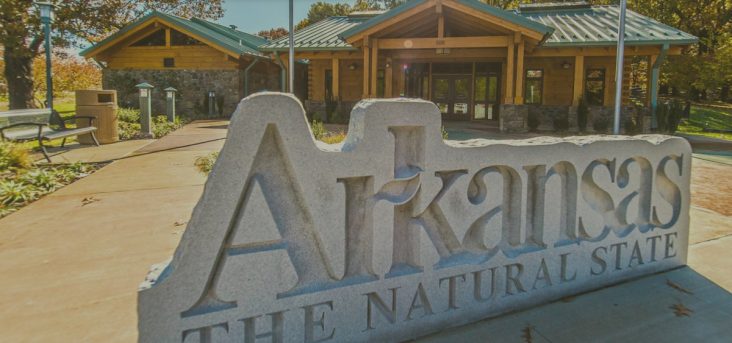Vaccinations will have ‘meaningful impact’ on recovery in Arkansas’ tourism industry
by March 2, 2021 2:10 pm 905 views

Arkansas Tourism Director Travis Napper said during the State of the Industry opening session of the Governor’s Conference on Tourism Tuesday (March 2) that though tourism was hit hard by the COVID-19 pandemic that began in March 2020, the outlook for the second half of 2021 looks bright.
“I understand how tough the past year has been. … The good news is we are already recovering and will continue to do so. I have no doubt that we will come back stronger than we were before,” Napper said.
At the beginning of the pandemic, Arkansas Tourism pulled advertising in order to avoid putting out confusing or contradictory information. Goals were changed to allocate advertising dollars where they would have the biggest impact. The department pivoted to virtual and online presence via the Arkansas at Home portal on arkansas.com, which included zoom backgrounds, virtual tours and more, Napper said. They also unveiled Arkansas Ready for Travel on the website, which will continue throughout 2021. These changes earned Arkansas Tourism a national award for outstanding achievement in web development, he said.
“Tourism is about more than travel. It’s about quality of life, economic stability and jobs,” Napper said. “The good news is that all the efforts worked. Although we recognized many parts of the state were impacted negatively, many spots in the state had record high visitation. It turns out Arkansas was well-positioned for a pandemic. Our wide-open spaces throughout the state offered plenty of opportunities for travelers to have fun, fulfilling experiences despite the pandemic.”
The bad news is the 2% lodging tax in Arkansas took a hit in 2020. At the end of fiscal year 2020, revenues from the tax were down 9.5%, and at the end of the year, the revenues were down 19%.
A BETTER SUMMER
Still, the state fared better than others across the country. According to a Tourism Economics study, only six states fared better in 2020 than Arkansas, he said. The study also found that 81% of American travelers report they plan to travel within the next six months, up from 65% from the end of January and the highest level indicated since last March, Napper said.
“With the challenges of the past year, every person involved with Arkansas tourism is a tourist person of the year. You have shown grit for the past year, and grit is what you’ll need as you nudge tourism along a path back to health,” Gov. Asa Hutchinson said during the session.

Kaitlin DiPaola, senior economist at Tourism Economics, said the situation with the pandemic, in general, has been dismal by any measure, but people should know it is improving and has been improving rather dramatically over the past six weeks, due in part to the administration of COVID vaccines.
“We are on track for vaccination levels of 40% to 50% of the U.S. population by June, and this sets the stage for an entirely different summer than experienced last year,” DiPaola said.
Even with more and more people getting the vaccine, uncertainty and anxiety is high. A Tourism Economics study showed that as of Feb. 17, travel confidence is still low with less than 50% of the population saying they feel safe traveling outside of their community.
“But we believe we are setting the stage for a significant recovery in travel,” DiPaola said.
‘MEANINGFUL IMPACT’ FROM VACCINATIONS
Criteria that lead to that belief are economy, interest rates, fiscal stimulus and savings. DiPaola said they fully expect the labor department to strengthen in the spring and summer with a labor market recovery that looks very different from that in the aftermath of the great financial crisis.
“We expect to be fully back to levels we were (before the pandemic) by summer,” she said.
She also noted that interest rates are near zero right now, which has a number of positive effects on the economy. The federal government also has spent over $5 trillion in fiscal stimulus “to combat the down surge,” she said, noting that is a “massive catalyst of economic recovery at every level, particularly the leisure market.”
Tourism Economics studies show households that have higher incomes have about $1.6 trillion in savings that can and be spent on travel once travel opens up more, she said.
“When will we recover? There is no getting around that the first quarter will be difficult. But look into the second quarter and beyond that. That’s when we expect the vaccination levels to have a meaningful impact, and it sets the stage for a leisure recovery,” DiPaola said. “We will continue living with COVID-19, but it won’t have the same devastating impact on the (tourism) industry as last summer.”
In the next six months, households will travel differently, DiPaola said. A Tourism Economics study shows 30% of households reported they would reduce the number of trips they are taking, 25% say they will travel within the U.S. instead of internationally, and 15% are choosing rural over urban destinations for travel. The good news is that only 15% plan to cancel trips in the next six months, she said.
Looking at the information provided by U.S. Travel Association, DiPaola said Tourism Economics expects leisure travel to get back to 2019 levels by 2022. The expectation is that leisure travel will get back to 90% of what they were by the end of the year, she said. Business and group travel is a different story. Studies show that business and group travel looks to normalize somewhat in the fall and winter, though it will be a slower recovery than individual travel. It will take until 2024 to get back to 2019 levels, DiPaola said. Still travel experts expect a much better second half of this year than the first.
Historic precedence in the aftermath of SARS showed that Hong Kong and Singapore fully recovered in terms of international travel within 14-17 months of the crisis being resolved, DiPaola said. Tourism Economics expects the same in the United States after the COVID pandemic has been resolved.
“We are starting to see that already. Data from Longwoods International shows 80% of households have plans to travel within the next six months. They are making plans and getting ready,” DiPaola said.
‘DEVASTATING CRISIS’
But the impact of the pandemic has been tremendous and there must be advocacy in Arkansas to help it recover, she said. The leisure and hospitality industry in Arkansas has been a leader in Arkansas employment. Employment in the industry has grown 21% over the past decade while state employment overall has grown by 10%, she said.
“Our industry has never seen such a devastating crisis,” she said. “So the leisure and hospitality industry has been a driver over the past decade. For Arkansas to continue growing we must restore this industry.”
Other than mining and logging, which saw a job loss of 17% since March 2020, no other industry has been hit as hard as travel, Tourism Economics data showed. As of February, leisure and hospitality has lost 12% of jobs relative to a year ago. About 40% of all jobs lost in Arkansas in the past year have been in the hospitality industry.
“It’s leading to the conclusion that a recovery in travel is necessary for a recovery in Arkansas. It is vital that policymakers support the travel industry and doing so is much needed for recovery,” DiPaola said.
Napper said once travel and tourism is in full recovery, the entire Arkansas economy will recover.
“We have to be honest with the reality that some may not recover, but we believe many will,” Napper said. “We are ready to return to a new sense of normalcy. How will we get there? With the same way we have persevered and confronted challenges in the past — with grit.”
